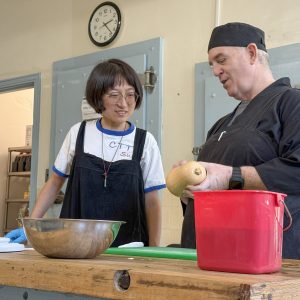
Amy Li, an alumna of the Graduate Certificate in Buddhist Translation and a current student in the Shojin Culinary Arts Certificate Program, recounts why she joined the culinary program and what she’s learned so far.
First of all, my personal reason for joining the program: I’ve been a Buddhist for a long time, especially under the Venerable Master Hua’s teaching, and I want to practice the Surangama Mantra and Sutra to perpetuate the proper Dharma in this world, to help it. One very crucial crucial thing is what we eat it and how we eat it, especially what the Sutra says: we should be vegetarian without the five pungents. Vegetarian is easier, but without the five pungents is very difficult. Even when you eat out at restaurants, even labelled with vegan, they have onion, garlic, leek, shallot. So I have a quite difficult time to make my own vegetarian dishes for myself.
So I have been struggling with this for a long time. How can I do this? When I started working—it’s just my personal experience. Maybe it doesn’t apply for anyone else. I was a spoiled child, an only child, and my parents would do everything for me. I didn’t know anything. I didn’t even know how to vacuum or sweep the floor. When I just came up came up working one like country. Previously I was working in Los Angeles for a few years. Then what to eat and how to eat was a huge struggle for me. I felt I might have had some nutritional deficiency or something, so I desperately wanted to learn how to cook. It’s a very important survival skill for living beings. I won’t have this worry for the future. You don’t know how excited I got when I saw this program established. I thought, Oh, this is exactly what I want.
Not only that. Typical vegetarian without the five pungents is usually Chinese or Vietnamese or Taiwanese cuisine, but this program is not limited to Asia. This also involves a lot of European cuisine—French, Spanish, Italian—a lot of this variety. That attracted me so much.
The second reason I joined the program is, after I learn this skill, not only can I cook for myself but for other people. That’s very important. I need to cultivate the heart of a bodhisattva. I want to serve other people and make other people happy. At the same time nurture not only their physical body but also their spiritual growth. This is very important important for me, so this is second second reason.
The third reason is, when I was a full-time volunteer at the City of Ten Thousand Buddhas kitchen, a Dharma master told me if you make a vow, the result will be much more positive than you can imagine. There’s a story about five people. They decided to cultivate together then, but they realized survival would be an issue. So one person stood up and said, Okay, I will do a lot of work to cook for you and do everything for you, so you four people just focus on cultivation. I hope you can make some progress during this life, while I support you. She also made a big vow hoping the other four people would acquire much wisdom—very good vows, with the very best wishes. So this is what that person did in their previous life. Then in this life, you know what happened? All of them left home, and the person who did everything, all the labor for the others, who made big vows, became the person with the greatest wisdom. What you give out finally comes back to you. You make sincere wishes, very pure wishes for other people, hoping good for others, and that good energy, that compassionate energy, comes back to you.
So in the CTTB kitchen I was told to make vows. Like during a bodhisattva session or a Dharma session, I can make a vow, I hope whoever eats my food can eradicate their offenses and have more blessings and wisdom and become a Buddha earlier. So this is the vow I made when I do everything. I think this principle can apply here, apply to everyone, in the future. I also can make those big vows. Making these vows not only benefits myself but other people. Then I can tie a big affinity with other people, whoever eats my food. I believe that in the future we can all become buddhas earlier, attain buddhahood earlier.
Samantabhadra Bodhisattva, when he was a cultivator, he worked as a tenzo (the chef at a Buddhist monastery), a cook or worker. He offered different ingredients to people eating at the monastery. One person said, I want more salt, so the bodhisattva brought him salt. Someone said, This is no good, I want that. So, very difficult for the bodhisattva to carry out their vow to benefit people, but this is the bodhisattva way, to always fulfill others’ wishes and benefit other beings in all aspects. Cultivating our buddhahood and at the same benefiting and liberating all living beings. So this is a huge spiritual cultivation background behind this program.
This program is not just cooking or skill based but also incorporates spiritual practice. For example, we sit in meditation for thirty minutes, which is very beneficial for all the following study and work and skill learning. After this thirty minutes, we discuss our readings, especially a book called How to Cook Your Life. This book is very good.
Also, Chef Squire is very spiritual and kind. He has a spiritual background already there. What we’ve been taught—we’re learning to be magnanimous, to be joyful—I feel Squire is already like that, so he can teach us. Everyone in this program, we learn with happiness, with fulfillment. I feel very grateful to have this opportunity to join the program. I feel maybe it’s a bodhisattva’s compassion that I could encounter this program.